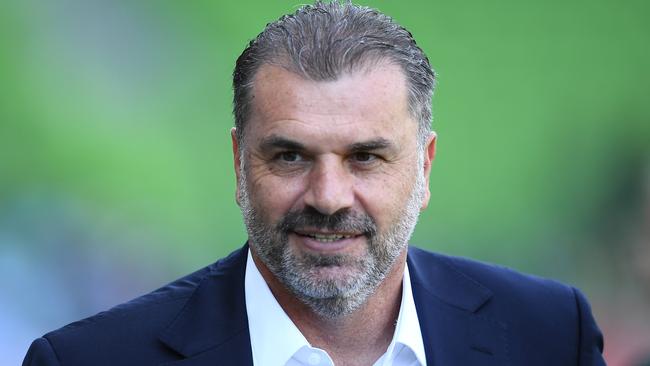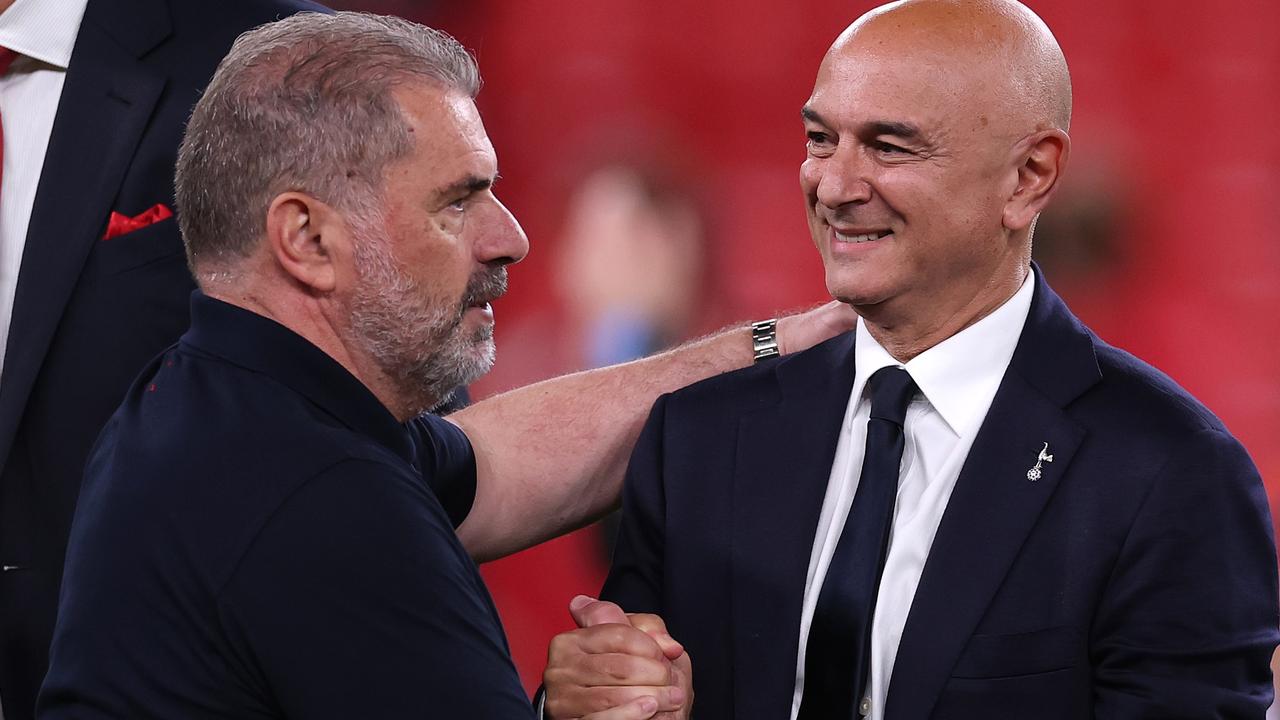Japan victory turns heads but Ange Postecoglou has ‘nothing to prove’
Ange Postecoglou sits in familiar surrounds, reflecting on his extraordinary foreign triumph during his whistlestop visit home.

Ange Postecoglou sits in familiar surrounds, reflecting on his extraordinary foreign triumph during his whistlestop visit home.
Perched in the heart of Oakleigh, in southeast Melbourne, a regular rendezvous during his Socceroos tenure, Postecoglou sips on coffee and tucks into an Aussie brunch that is hard to come by in downtown Yokohoma — even when you’re not clocking up 80 hours a week trying to win a J1 League title with an unfancied side on a modest budget.
This is that sweet spot — just after the conquest and long enough before “operation back-to-back” starts — where Postecoglou is in his football zen.
Yokohama F. Marinos’ cavalier triumph, Socceroos reflections, the future of the game in Australia. Nothing is off the table for one of Australian football’s deepest thinkers, whose intellect, vision and inclination to march to the beat of his own drum remains uncomfortable for many.
An hour-long catch-up stretched beyond 90 minutes, with no less than 15 people stopping by to pose for photos and congratulate the former Socceroos coach.
As if a metaphor that Australia’s premier round-ball coach had nothing to prove, Postecoglou, appearing as comfortable in his own skin as he’s ever been, declared that he was not hellbent on moving to Europe, despite attracting global interest with his triumph in Japan.
“People say it’d be great to see him get a crack at the Premier League, see how he goes. I see it differently. I don’t need to prove anything to anybody. If it happens it happens, if it doesn’t it doesn’t,” Postecoglou said.
“I just want to keep doing stuff that leaves a mark. When people talk about us winning a championship at South Melbourne, going back-to-back, at Brisbane — talk about Roar-celona and 36 games unbeaten, Socceroos we won our first trophy, Yokohama trophy and the way we’re playing.
“If that ends me up in the top league in Europe, great. If not I’ll keep doing what I’ve always done and try and leave a mark wherever I am. I’m not fixed on ‘this is what I want to do, this is my ambition’ as a point to prove.
“There has been and that’s part of the industry we’re in, when you have success people take notice. But I won’t jump into anything. I’ll keep doing what I’m doing. If something comes across my path that I think ‘let’s have a crack at this’ then I’ll do it. As much success as I had in Australia, having this success abroad, more people have taken notice in Europe and the rest of Asia.
“But because they’ve taken notice of this, they’ve looked back and said ‘hold on a sec, he’s had success for a long time’ so the success I had in Australia all of a sudden becomes relevant. It’s not just a flash in the pan.”
As he prepares for another change to his coaching staff with assistant Peter Cklamovski headhunted by J1 League rivals Shimizu S-Pulse, Postecoglou revealed that he’s studied one of the greats.
A secret to Alex Ferguson’s success was the constant evolution of his coaching staff, which enabled him to stay at the helm of Manchester United for 27 years. Postecoglou, age 54, won’t necessarily coach on as long as Ferguson — who retired at 72.
“Big part of me wants to sit on the Greek Islands and do nothing. I’ll give it away at some stage. If I feel I’m starting to slip, and can’t be as successful as before, in other words stay at the highest level, I’ll (retire),” he said.
“I’ve always been mindful of (evolving). People talk about success, the thing I’m most proud of is that I’m heading into my fourth decade of coaching — I had success in 90s with South, 2000s with Brisbane, then Socceroos and now Yokohama. Knowing how much the game’s changed, society’s changed, people have changed, the way we communicate has changed, I take pride in that, that I’ve transcended. Which means I’ve evolved as a person, a coach, a leader.
“Part of the reason is because I’ve always worked with different people — Mikey Petersen, Rado Vidosic, Ken Stead, Kevin Muscat, Milicic, Pete (Cklamovski), Arthur (Papas).
“I’ve tried to bring in different people and different generational people, which keeps me always alert that my message is relevant and timely.”
Postecoglou remains proud of his four-year Socceroos tenure, despite an exit that still polarises.
“People say he walked away before going to the World Cup. You knew what you were going to get — you saw it four years earlier. We would’ve had a crack against France and the rest,” Postecoglou said.
“We might have lost three games, but we would’ve had a crack. I’m proud of my four years. Winning the Asian Cup was underestimated, it’s like winning the Euros — people still talk about Greece winning Euro 2004. It’s a continental tournament, who knows when we’ll win one again?”
Postecoglou never doubted himself, but revealed that his wife Georgia had an immense role in his career coaching rollercoaster.
From working the clipboards while he was conducting junior clinics in Kooyong when no one in Australia wanted to touch him, to constant moves — yet she still doesn’t hassle him to complete house chores, perhaps because he is too busy tucking into a catalogue of international football matches.
“I’m just no good at that (chores). I try and keep her happy. I love football, it’s my passion. But at home I’m the happiest. Home life is everything,” he said.
“I couldn’t have done what I’ve done without her. She believes in me more than anyone else in the world. None of this would have been possible without her. We’ve lived in 10 houses in 13 years and she’s never complained.”
Postecoglou has not and will not watch the final game of the season, the famous 3-0 win over FC Tokyo when Yokohama secured the title.
“You want to keep it in a perfect box and don’t want to analyse it too deeply,” Postecoglou said.
“It was an extraordinary finish, but our last two months of football, I was really proud of how we finished the season off. We were worthy champions.
“The players’ mentality at the end of the season was so positive and powerful — I was hardly coaching at the end, they were driving it themselves.
“The second year is always more challenging. If you bring in some new blood and energy, the players who’ve tasted the success will grow with that. It’s a good challenge.”
HERALD SUN



To join the conversation, please log in. Don't have an account? Register
Join the conversation, you are commenting as Logout